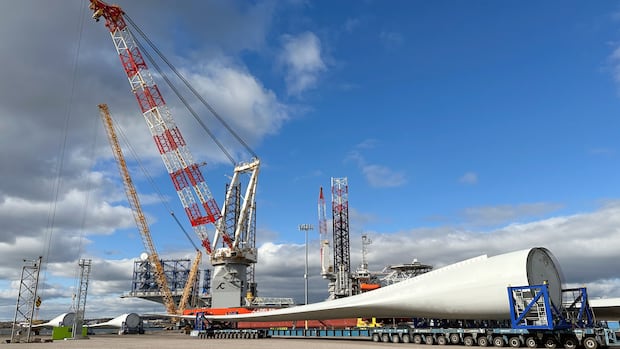Top Stories
Cape Breton Firm Declares No Need for Offshore Wind Subsidies

UPDATE: A Sydney, N.S. company has made a bold declaration that it does not require government subsidies to kickstart its offshore wind operations, despite ongoing discussions about financial support for the burgeoning renewable energy sector. Atlantic Canada Bulk Terminal vice-president Richard Morykot stated that while substantial investments are essential for the industry, public funds should focus on upgrading the electrical grid rather than directly aiding private companies.
This announcement comes in the wake of a recent report from Net Zero Atlantic, which highlighted the need for hundreds of millions of dollars to prepare ports for offshore wind projects in Canadian waters. The report, released in August 2023, ranked the Sydney terminal among the top locations for readiness, suggesting it could require an initial investment of $135 million to begin operations.
At a recent conference, a German expert emphasized the necessity of government subsidies for the offshore wind energy sector to become viable. However, Morykot countered this notion, asserting that while billions will be needed for large-scale wind farms, contractors like his company are already making significant investments without relying on public funds. He noted, “We peg the cost to get into the business at about $50 million to $150 million, rather than the $135 million to $230 million reported.”
Morykot explained that the terminal has already invested tens of millions and has been preparing components for the U.S. offshore wind sector, positioning itself for a similar boom in Canada. He expressed concern that pushing for subsidies could divert attention from critical infrastructure upgrades necessary for the industry’s success.
The Net Zero Atlantic report also indicated that other ports, including those in New Brunswick and Newfoundland and Labrador, could require up to $250 million for initial stages of offshore wind operations. The report outlined more extensive financial needs for full-service operations, with the proposed Melford Terminal needing over $440 million to be fully operational.
Lorna Campbell, CEO of the Port of Sydney Development Corporation, highlighted the positive economic implications of the terminal’s involvement in offshore wind, suggesting that it could lead to growth in manufacturing and support services. “There are economic benefits to that, and that’s just the tip of the iceberg,” she stated, referring to the potential for diversification beyond the port’s current focus on cruise ships.
The urgency surrounding these developments cannot be overstated. As global demand for renewable energy sources surges, the readiness of Atlantic Canada’s ports will play a crucial role in the region’s economic future. The focus now shifts to how quickly these projects can be mobilized and whether government investment strategies will align with industry needs.
With talks of financial support lingering, the spotlight is on private enterprises like Atlantic Canada Bulk Terminal to lead the charge in renewable energy. As Morykot noted, the time for action is now, and the path to a sustainable future hinges on smart investments in both public infrastructure and private capabilities.
Stay tuned for more updates as this story develops.
-

 World4 months ago
World4 months agoScientists Unearth Ancient Antarctic Ice to Unlock Climate Secrets
-

 Entertainment4 months ago
Entertainment4 months agoTrump and McCormick to Announce $70 Billion Energy Investments
-

 Lifestyle4 months ago
Lifestyle4 months agoTransLink Launches Food Truck Program to Boost Revenue in Vancouver
-

 Science4 months ago
Science4 months agoFour Astronauts Return to Earth After International Space Station Mission
-

 Technology2 months ago
Technology2 months agoApple Notes Enhances Functionality with Markdown Support in macOS 26
-

 Top Stories4 weeks ago
Top Stories4 weeks agoUrgent Update: Fatal Crash on Highway 99 Claims Life of Pitt Meadows Man
-

 Sports4 months ago
Sports4 months agoSearch Underway for Missing Hunter Amid Hokkaido Bear Emergency
-

 Politics3 months ago
Politics3 months agoUkrainian Tennis Star Elina Svitolina Faces Death Threats Online
-

 Politics4 months ago
Politics4 months agoCarney Engages First Nations Leaders at Development Law Summit
-

 Technology4 months ago
Technology4 months agoFrosthaven Launches Early Access on July 31, 2025
-

 Top Stories2 weeks ago
Top Stories2 weeks agoFamily Remembers Beverley Rowbotham 25 Years After Murder
-

 Top Stories6 days ago
Top Stories6 days agoBlake Snell’s Frustration Ignites Toronto Blue Jays Fan Fury





















